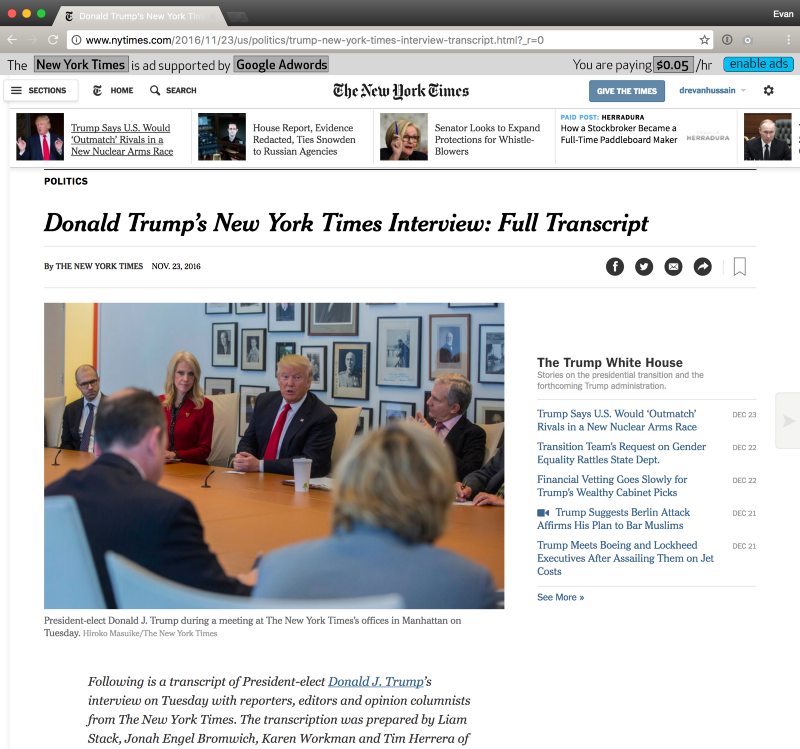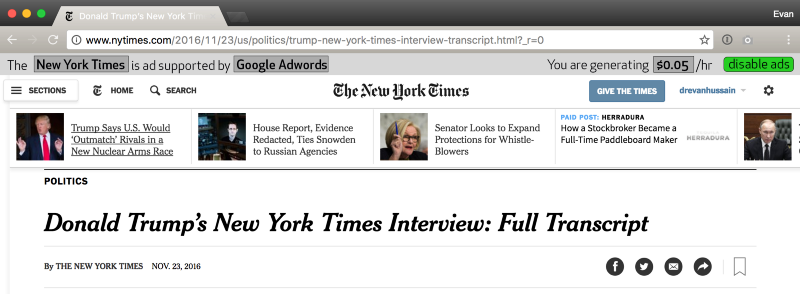Listen to this wonderful interview on KQED (NPR)’s "Forum" with Dr. Tim Wu On Advertising, Fake News and ‘Attention Harvesting’
REBROADCAST: Tim Wu On Advertising, Fake News and 'Attention Harvesting'
Tim Wu is a professor at Colombia University who focuses on the science and history of advertising. He gives a good summary of:
- How Media has often been ad-supported, going back to the "penny papers" of the early 1900’s, and cheap access to information is, on principal, a good thing. The information revolution probably would not have happened otherwise.
- How the perfect storm of ad-supported media (both digital and traditional) optimize for clicks/views and can get into ethically questionable areas
- How politics is an attention game, and Trump is a master at it, being both a billionaire and a celebrity.
- And finally how political "Fake News" is a logical conclusion of the above.
When discussing the Google and Facebook’s recent actions to combat Fake News, Dr. Wu does agree that when you advertise that you are selling "News", you should be held to a higher standard than other types of advertisements; that there is a moral imperative behind the word "News", which I agree with. However enforcing this moral imperative is a rabbit hole of first-amendment ridden problems…
I think there will always be a chicken + egg problem with "Fake News", no matter how vigilant Google and Facebook are. The media and news ad-supported business models we have are, by nature opaque. They therefore create a situation where both the real and fake advertisers are playing the same game by the same rules.
Dr. Wu closes the interview with an offhand remark about how, when he’s feeling optimistic, he can see a better advertising future in which consumers are treated more fairly with regards to what they are consuming. To paraphrase:
If I walk into a shoe store and see that they are charging $1,000 for a pair of shoes, I know that is not a transaction I want to be involved in. When I watch the Olympics, I know I’ll be watching *some* advertising, but is 6 minutes of commercials every 1/2 hour worth it? Maybe I would rather pay for this content…
This is a technology blog. I am a nerd who makes websites. I was fascinated by Dr Wu’s final comments about what he postulates future advertising might look like. It seems to center around the idea of choice, and removing the opaqueness from the process. I wanted to mock up what it would look like to give consumers an ethical advertising choice.

OR

- Notice how there are no in-page ads at all when I’ve elected to pay for the content.
- I am being presented with a real, live exchange rate between USD and "Ad Time", which in turn presents me with the information I need as a consumer to make an informed purchasing decision. Yes, consuming ad-supported content is still a purchasing choice, and we should make that clear.
- Should I not have opted to pay for this content, I would be generating $0.05/hour for the content creator, rather than spending it**.**
- The content producers do not need to change their business model at all. Should they elect to remain ad-supported, they can! Either way, they add a
<GoogleAdWords />tag to their site, and off they go. The existing ad delivery networks handle the rest, including payouts to the content creators.
There are a few examples I can think of where a company offers a hybrid "free + ads" or "paid and no ads" choice to the consumer. Spotify, Hulu, Pandora, etc… but they are all entertainment companies. I know that my choice to spend $10/month on Spotify Premium probably saves me from listening to a few hours of Ads each month… and I can make an informed consumer choice to pay it. I do not know of a news organization that gives me the same option.
The mockup above is something that we have the technology to implement today, should we want to. It could be account-based (you *must* stay signed in to sites’ ad delivery partners at all times), or it could be a baked into the browser, which restricts access to certain content once a maximum "time balance" has been reached.
What’s fascinating is that I don’t need to pay the advertisers in money. Say I’ve accumulated a balance of $5.00 by browsing around the web for a month. At the end of the month I have a choice:
- Either pay $5.00 with my credit card, which the ad delivery network will then pay a portion back to the content sites I’ve visited
- I can change my mind, and want to "pay" for the content with ads again. I can then watch 30 minutes of ads, all in one place. Once the advertisers of those ads pay the ad delivery network, then in turn, the sites I’ve visited will be paid.
Option #2 is interesting because I’ve effetely separated my advertisement experience from the content. I’ve finally removed any bias I would feel from the ads with regard to the news, by deferring the "ad cost" until later.
Is this a good idea? Or is this a vision of the end of the anonymous web, and a vision of a dystonic future?
The exchange rate ($0.05/hr) was calculated as follows:
- Assume the average person spends 50 minutes on Facebook each day which I rounded to 1 hour/day
- The average CPC (cost per click) for a Facebook ad in Q3 2016 was $0.27
- Lets assume the average person clicks on one Facebook ad a week (I can’t find any good data on this assumption), so 1 ad click would accumulate every 7 hours of browsing Facebook.
- I added a 20% safety factor($0.01) to account for inaccuracy in these assumptions
Yes, it would cost me ~$1.50 to read the New York Times every day for 1 hour in a month… and I think I’m OK with that.

I write about Technology, Software, and Startups. I use my Product Management, Software Engineering, and Leadership skills to build teams that create world-class digital products.
Get in touch